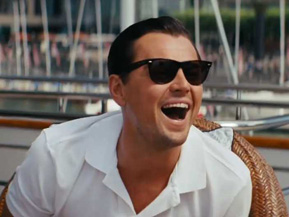Movie Review: The Wolf of Wall Street
By Matthew Huntley
January 6, 2014
Martin Scorsese’s The Wolf of Wall Street could be the last film needed to secure a new genre of movies simply called “wall street.” Others in the category would include, of course, Oliver Stone’s Wall Street, which started it all, Boiler Room, Margin Call, and the documentaries Enron: The Smartest Guys in the Room and Inside Job. Basically, the genre would be comprised of movies that depict the rise and fall of men whose very livelihood depends on finding new ways of making (more) money and maintaining power, particularly on Wall Street.
The other movies I mentioned, which all came out long before Scorsese’s, suggest Wolf isn’t the most novel in what it sets out to do, and compared to its brethren, as well as other Scorsese epics like Goodfellas and Casino, it very much adheres to a formula. But Scorsese, being a master of style, doesn’t let this prevent him from still making a dynamic, fierce and often visually splendid cautionary tale. In fact, Wolf practically admits it’s more about style than depth (something the main character more or less tells us point blank), and we enjoy it as such, both as a drama and comedy. Still, even as an exercise in style, it could have been shorter.
Leonardo DiCaprio, in a scarily convincing performance, plays Jordan Belfort, to whom the “wolf” in the title refers. Belfort acquires his moniker after Forbes Magazine calls him a “twisted Robin Hood” because his brokerage firm seems to steal from the rich and give to itself. But, as Belfort’s wife says, “There’s no such thing as bad publicity,” and she’s right - the next day, every hotshot wannabe on Wall Street rushes to Belfort’s office door begging for a job.
Forbes was right, too. Indeed Belfort did earn his fortune by convincing rich people to buy shares in fruitless penny stocks, which yield a 50% commission to brokers, even though the stocks themselves don’t earn all that much, if anything (Belfort initially referred to the practice as “selling garbage to garbage men”). He starts off earning tens of thousands of dollars a month and then upgrades to millions per hour in some instances.
Before long, Belfort has more money than he can count and begins feeding a lifestyle that includes experimenting with any and all kinds of drugs, giving grandiose speeches to his hundreds of faithful followers, philandering with different types of prostitutes (yes, he tells us there are different types), incessant drinking, minimal sleep and then waking up and doing it all over again. And he’s not coy or ashamed about any of it. He fell in love with Wall Street’s high the day he started and it quickly became an addiction.
Like most men in these stories, as far back as Charles Foster Kane in Citizen Kane, Belfort came from humble beginnings. At the ripe age of 22, the Queens native got off the bus, kissed his wife (Cristin Milioti) good-bye and went to work as a stockbroker eager to make a decent, honest living. But his life changed the moment he met Mark Hana (Matthew McConaughey), who passed down his philosophies for drugging, boozing, masturbating and debauchery onto Belfort, who was in complete awe.
Continued:
1
2




